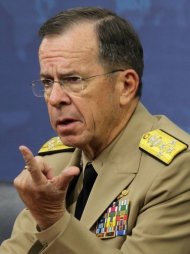By Jim Garamone
American Forces Press Service
CAMP EGGERS, Afghanistan, July 9, 2011 - Defense Secretary Leon E. Panetta assured President Hamid Karzai of the United States' continued, long-term commitment to Afghanistan during meetings in Kabul today.
|
While it was the secretary's first meeting with Karzai in his new position, Panetta has dealt with the president while serving as the director of the Central Intelligence Agency.
Panetta said he has a good relationship with the Afghan leader and that they will work together closely to ensure the relationship remains positive.
The goal is to establish a real partnership between the United States and Afghanistan, the secretary said.
Panetta said he believes the coalition and the Afghans are moving in the right direction in Afghanistan. He credits the military strategy in place and the resources provided by President Barack Obama and the American people.
The successes to date are giving the Afghans the opportunity "to establish their own independence free of Taliban influence," he said.
During the meeting Karzai and Panetta discussed the transition now underway to shift security responsibility to Afghan forces, Panetta said. Overall, seven areas – three provinces and four municipalities covering 25 percent of the population – will transition to Afghan responsibility.
"We can begin the process of drawing down our forces," Panetta said. "I think we've got the momentum on our side, President Karzai is supportive of President Obama's proposal and we are both confident that we can get this done in a way that not only protects the security of Afghanistan but ensures the Taliban cannot return to this country."
The United States will withdraw 10,000 troops by the end of the year and will draw down another 23,000 by the end of September 2012. That still leaves around 70,000 U.S. troops in Afghanistan. Those troops "will continue the strategy and operations through 2014," Panetta said. "My goal is to make sure we can continue the effort to establish greater security in this country so we can transition to the Afghans."
Karzai and Panetta also discussed the quality of Afghan forces. The training effort is paying off, but there is more to do, Panetta said. Afghan officials told Panetta that they are looking to improve the quality of the officer and noncommissioned officer corps. "Bottom line is they have an increasing confidence in their military to do the job," he said.
Karzai asked Panetta how the United States managed to field an Army that was both professional and apolitical throughout its history.

"I said it began with George Washington making very clear that that's the way we ought to be operating," Panetta said. "I told him it would be well if he would do the same thing as president of this country."


















